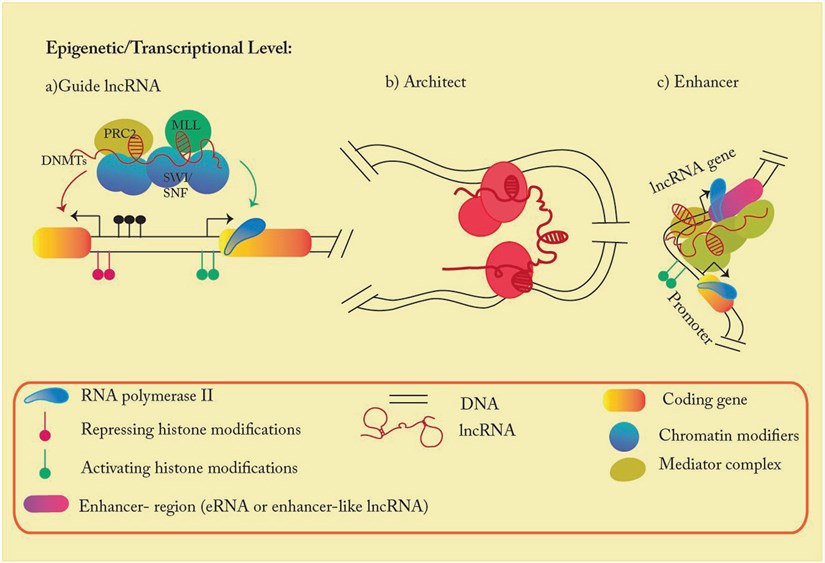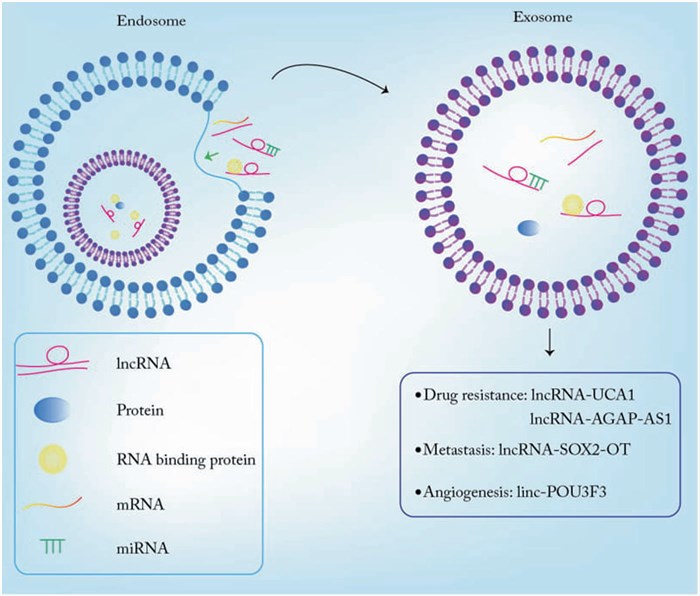Exosomal LncRNA Microarray
Introduction of lncRNA
Long noncoding RNAs (lncRNAs), which are more than 200 nucleotides in length, were regarded as transcriptional noise just a few years ago. However, advances in sequencing technologies have indicated that they play a vital role in numerous biological processes, including cell proliferation and differentiation, cell growth, and cell apoptosis. lncRNAs are classified into many different types based on their genomic structure and origin. Some of the lncRNAs are pseudogenes that contain mutations, making them noncoding sequences. Many of the lncRNA coding sequences overlap with coding genes, entirely or partially. lncRNA expression is mainly tissue-specific; this suggests their possible functional role in physiological and biological processes. Accordingly, it has been shown that lncRNAs are engaged in many different biological processes within the cell and exert specific functions in different stages of cell regulation. Recent studies have shown that lncRNAs are important regulators of cancer-related cellular pathways. lncRNAs play key roles at the epigenetic level, through interacting with chromatin-modifying complexes or by regulating at the transcriptional level through interactions with DNA regulatory elements. Other lncRNAs regulate gene expression by interfering with posttranscriptional nuclear machinery.
 Fig. 1 lncRNA, a biochemically versatile polymer ( epigenetic/transcriptional level). (Yousefi, 2020)
Fig. 1 lncRNA, a biochemically versatile polymer ( epigenetic/transcriptional level). (Yousefi, 2020)
Exosomal lncRNA
In recent years, with the development of molecular biology techniques, the important role of exosomal lncRNA in disease progression has been gradually discovered by researchers. According to previous researches, lncRNAs can be packaged into exosomes and act as messengers in cell-to-cell communication. Notably, some lncRNAs are enriched in exosomes, while others are barely present, indicating that some lncRNAs are selectively sorted into exosomes. In this context, the analysis of exosomal lncRNA has entered the vision of researchers and is becoming more and more important.
 Fig.2 Exosomal lncRNAs promote metastasis, drug resistance, and angiogenesis in cancer cells. (Yousefi, 2020)
Fig.2 Exosomal lncRNAs promote metastasis, drug resistance, and angiogenesis in cancer cells. (Yousefi, 2020)
Exosomal lncRNA Microarray
An important strength of microarray-based ligand screening is the simultaneous screening of a large number of immobilized ligands (often more than 10,000) with the biomolecule of interest, significantly more high-throughput than traditional RNA binding assays. Furthermore, the microarray approach requires a relatively small amount of RNA to be used, making it particularly powerful when studying RNA that is difficult to prepare in large quantities. Finally, microarray screens may be performed in parallel or multiplexed to generate selectivity information not available by traditional biochemical assays. These advantages are critical for exosome lncRNA analysis as the content of lncRNA in exosomes is usually low.
Services at Creative Biolabs
Exosome RNA next-generation sequencing is an important part of exosome research. More and more reports have shown the variety of roles LncRNA plays in exosome researches. Focusing on exosome researches over years, Creative Biolabs has accumulated extensive experience from practice. Thus we have established a comprehensive technology platform to provide our clients with convenient one-stop services. To help with the dilemma researchers encountered in this field, we launch exosomal lncRNA microarray services with lower samples amount requirements and higher efficiency.
If you are looking for a partner in exosome research or you have any questions about our services, please feel free to contact us for professional solutions from our expert team.
Reference
-
Yousefi, H.; et al. Long noncoding RNAs and exosomal lncRNAs: classification, and mechanisms in breast cancer metastasis and drug resistance. Oncogene. 2020, 39(5): 953-974.
For Research Use Only. Cannot be used by patients.
Related Services:

 Fig. 1 lncRNA, a biochemically versatile polymer ( epigenetic/transcriptional level). (Yousefi, 2020)
Fig. 1 lncRNA, a biochemically versatile polymer ( epigenetic/transcriptional level). (Yousefi, 2020)
 Fig.2 Exosomal lncRNAs promote metastasis, drug resistance, and angiogenesis in cancer cells. (Yousefi, 2020)
Fig.2 Exosomal lncRNAs promote metastasis, drug resistance, and angiogenesis in cancer cells. (Yousefi, 2020)








